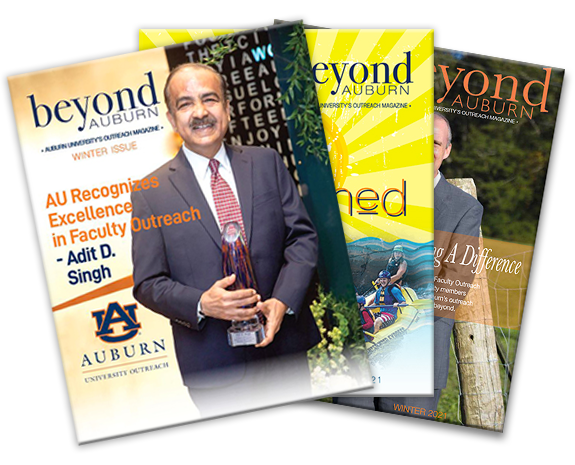Beyond Auburn Magazine
Winter 2023: Gibson-Young earns Auburn’s highest honor for faculty outreach as activist for children’s health
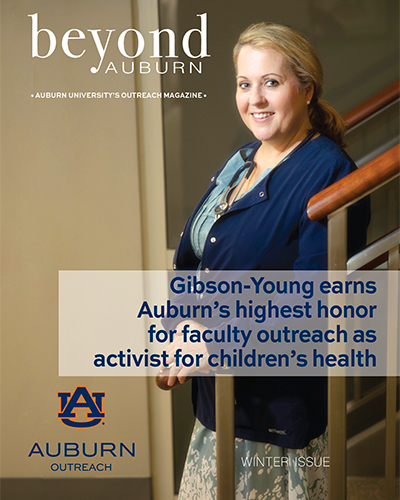
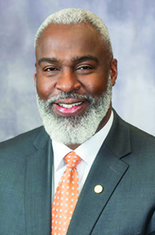
Each semester, the campus is alive with students attending classes and thousands of visitors enjoying sports and other activities across the institution. It is also a busy time for University Outreach as we launch a variety of new initiatives as part of our vibrant service mission to thousands of Alabamians and many more beyond.
In August, we convened the entire University Outreach team for a Fall Kick-off Retreat. Developed for the division by our Outreach Retreat Planning Committee, this was the first of a new series of monthly events intended to inform and engage our outreach faculty and staff on relevant topics and outcomes related to our work. During the initial event, the directors of each of our units and offices briefed us on the wide array of public service projects, professional and continuing education programs and faculty and community engagement underway across our division. It was exciting to learn about the real and documented impact Auburn Outreach generates for the communities we serve. We also announced the launch of our new “Auburn Across Alabama” faculty tour, the annual Outreach Symposium and the creation of an Outreach Student Ambassador program.
The highlight of our kick-off retreat was the visit by President Christopher B. Roberts and Interim Provost Vini Nathan, who both provided greetings and their reflections on the significance of the Outreach mission at Auburn University. As longtime members of the Auburn family, President Roberts and Nathan are no strangers to faculty engagement and outreach work – as deans, they presided over some of the university’s most prestigious and successful outreach initiatives. Each emphasized the strategic importance of the outreach mission to Auburn University, our standing as a recognized Carnegie engaged institution, and the value of outreach work in collaboration with faculty, staff, and students across the institution. As were all the participants of the retreat, I was most gratified by the president and provost’s support and enthusiasm for the outreach mission.
Notably, Nathan expressed in her comments that Auburn’s strategic and impactful outreach comes because of a lot of hard work. Yet that hard work makes outreach even more meaningful for those engaged in producing outreach as well as valued by those it serves.
Indeed, outreach is hard work, in part because we are addressing great needs and difficult issues facing our communities, and in part because we serve broad constituencies well beyond campus. Performing outreach as part of already packed scholarly and work assignments is hard work as well. However, to paraphrase President John F. Kennedy, we do this work “not because it is easy, but because it is hard, because that goal will serve to organize and measure the best of our energies and skills.”
A great exemplar of the outreach ethic is our recipient of the Auburn University Award for Excellence in University Outreach for 2022, Linda Gibson-Young. Gibson-Young is professor and director of Outreach for the College of Nursing. She has an exemplary record of outreach scholarship and engaged practice focused on improving the health and wellness of children and elder adults in rural communities across our state. Her leadership in promoting engaged school- based and community-led health interventions has made an immeasurable contribution to scholarship in the academy and – more importantly – is having a significant impact in the communities she serves. I commend Gibson-Young for her achievements and congratulate her for this well-earned award.
We are part of our nation’s great land-grant tradition of outreach and engagement, recognized nationally in the highest circles of the academy, supported by our institutional mission and strategic plan, counted as scholarship in our faculty guidelines and encouraged by our leadership. Outreach is hard work, but it is work that makes a clear difference both on campus as well as in the community.
Join me in making that difference!
War Eagle and best regards,
Royrickers Cook, Ph.D.
Vice President for University Outreach and Associate Provost
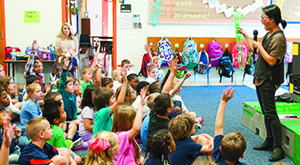
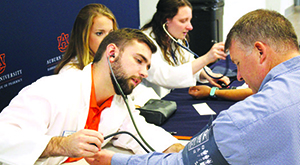
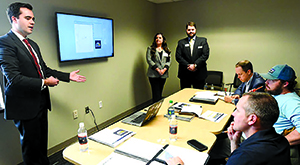
Outreach at Auburn University is an essential component in its three-prong mission of instruction, research and outreach.
Support outreach today!
auburn.edu/outreach/makesadifference.htm
ACADEMICS. RESEARCH. OUTREACH
Campus and community friends are invited to use these interactive platforms to share their opportunities, projects and programs.
AuburnServes
The AuburnServes network functions as a repository for community partners to chronicle needs and offer volunteer opportunities to students
Outreach Programs and Projects Network
Through this database, Auburn University faculty can share information about their Outreach programs and projects to facilitate further engagement, promotion and partnerships.

Linda Gibson-Young has always had a passion for helping others.
It’s what drew her to seek a career in nursing in the first place. She would eventually become an educator as well, following in her parents’ footsteps, because it was another way of helping.
Gibson-Young has used these roles to address pediatric health, particularly helping families and children live with childhood asthma.
Since joining the faculty of Auburn University’s College of Nursing in 2016, she has made a name for herself in Alabama and beyond as an advocate for children’s health. Her outreach efforts and work at the state level have influenced countless lives in and out of the classroom.
For her dedication and service to others, Gibson- Young received the 2022 Auburn University Award for Excellence in Faculty Outreach. The award, presented by the Office of the Provost at the annual Faculty Awards Ceremony, honors the engagement of exemplary faculty members and demonstrates the tremendous impact Outreach has on our community, state, nation and beyond.
“I am honored that the College of Nursing is represented with this award,” said Gibson-Young, the East Alabama Medical Center/Dr. Bill Lazenby Endowed Professor and Outreach Coordinator for the college. “We truly have an amazing team impacting the state of Alabama and beyond with outreach. As a land- grant institution, we want to lead outreach efforts to drive health forward in the communities, and I am thrilled to have a role in such efforts.”
Practice begins
Gibson-Young was born in Reno, Nevada, but Alabama is home. Her father, a member of the U.S. Air Force, retired in Montgomery. Gibson-Young said she shadowed a few health care professionals after high school and found that she enjoyed both medicine and nursing.
When she realized a family nurse practitioner would allow her to serve both areas, she said she “jumped in head first.”
After earning nursing degrees from Auburn University at Montgomery and the University of Alabama at Birmingham, or UAB, Gibson-Young was a practicing family nurse practitioner, focusing on children and families managing asthma. She completed a doctorate at UAB with a focus on families and asthma.
Gibson-Young’s nursing career started at the bedside, where she spent seven years working with children impacted by pulmonary diagnoses.
“Since then, I have continued focusing on child asthma, the most common pulmonary condition in children,” she said.
An educator is born
Gibson-Young began her academic career at UAB while finishing her doctorate. She then worked as an assistant professor at the College of Nursing at the University of Central Florida in Orlando, Florida, and an associate professor at the College of Nursing and Health Sciences at Texas A&M University-Corpus Christi.
In 2016, Gibson-Young said her heart pulled her back to Alabama, where she found a post with Auburn Nursing.
In the College of Nursing, her teaching responsibilities include community and pediatrics for undergraduate nursing students through classroom, simulation and clinical opportunities, as well as online courses in evidence-based practice and population health for master’s and doctoral students.
Gibson-Young even leads undergraduates in the Honors College in research symposium courses as they prepare to focus on child health-related fields. Her research is focused on pediatrics because “my clear passion is to improve the health of children and families living with child asthma. This is a chronic disease and should be controlled to have lifelong health.”

Outside the classroom
One way of addressing childhood asthma is educating young people and their caregivers at home and at school about managing and living with the disease.
“Good health starts in early life, and we must help encourage our children to take care of the one body they have,” said Gibson-Young. “If we can educate children with outreach educational programs, like TigerCHAT and Asthma Camp Eagle, we can make an impact in lives across Alabama and beyond.”
TigerCHAT and Asthma Camp Eagle are two of the outreach programs Gibson-Young has started since coming to Auburn.
TigerCHAT, or Community Health Awareness and Training, was started in 2018 as a partnership between Auburn Nursing and the Russell Medical Foundation. The collaborative health education program is designed to educate children in kindergarten through sixth grade about healthy behaviors, including nutrition, physical activity, respiratory health and mental health.
So far, the program has reached more than 10,000 children in 18 schools across three counties.
Asthma Camp Eagle was started in 2017 as a partnership between Auburn Nursing, Children’s Harbor and the Morris Family. Additional funding is provided by the Kiwanis Club of Alexander City, Jim and Pam Williams and the Meredith Williams Foundation.
The free residential summer camp at Children’s Harbor on Lake Martin provides children 7 to 12 years of age with a fun environment to learn how to manage their asthma and live normal, healthy lives. Campers spend their days in the outdoors, playing in groups, swimming, doing art projects and learning about asthma and nutrition.
Fifty children will experience the camp in July.
As the outreach coordinator for the college, Gibson- Young manages 30 other outreach programs.
A permanent passion
It seems like Gibson-Young was born with a desire to help people. Since her first day as a nursing student, that basic desire transformed into an unrelenting focus on helping children manage their health.
Her persistence has never wavered, no matter what challenge lay ahead, even one that hit close to home.
Gibson-Young and her husband Jeff Young, a fellow nurse, welcomed a healthy baby boy into the world 14 years ago. Within Greyson’s first three years, he was diagnosed with moderate persistent asthma.
Asthma is a lung disease that makes breathing difficult for millions of Americans, including about 6 million children. There is no cure, but it can be controlled with medication and education. For the Youngs, it has influenced every aspect of their life, but Linda and Jeff have managed to make sure Greyson lives the life of an average, active teenage boy. He loves sports, especially basketball, and runs his own lawn care company.
This makes the Youngs ideal educators and advocates for families living with asthma.
“We clearly understand the impact asthma has every day on families,” said Gibson-Young.
Grayson’s health has likely strengthened his mother’s resolve to ensure all children and families learn to live their best lives, despite asthma.
“I know we can work on asthma control in children, to improve lung function of adults living with asthma,” she said. “We can make an impact with proper preventative care.”
To ensure her efforts have broad impact, Gibson- Young also serves on posts at the state level, including community positions on interdisciplinary asthma management boards among two children’s hospitals, contributing to education policies that transform how asthma is managed in clinical practice.
Additionally, she chairs the Alabama Asthma Coalition, a grassroots effort connecting state organizations on asthma management. One area of focus for this year addresses environmental changes to improve air quality.

Auburn University’s Outreach Global Office and the Harbert College of Business, in collaboration with the Institute of Cultural Affairs Benin, or ICA Benin, presented a Success Through Entrepreneurship Program, or STEP, targeting youth, female microentrepreneurs and STEM—Science, Technology, Engineering and Mathematics—students in Benin, West Africa.
The entrepreneurial training program, which took place in June, attracted over 150 participants in Cotonou, Benin, and was led by LaKami Baker, associate professor in Harbert’s Department of Management with the Russell Foundation Professorship of Entrepreneurial Studies, and Outreach Global director Elizabeth I. Quansah. The training was designed to equip Benin women, youth and students with the knowledge and practical entrepreneurial and marketing skills needed to build a viable and sustainable business venture.
Participants learned basic business skills in finance, marketing, communications, public speaking and entrepreneurship. Additionally, they were trained in the Lean Startup methodology to learn how to develop compelling value propositions and scalable business models.
The STEP program expands Auburn’s relationship with ICA Benin to leverage the expertise of the university working with microentrepreneurs from historically underserved communities in the United States and providing entrepreneurial skills training for low- income youth to work with microentrepreneurs and youth in Benin.
Although poverty in Benin remains high, there is evidence that increased entrepreneurial activity can play a significant role in economic advancement.
The training program is currently under consideration by the Unites States Embassy in Benin for a capacity grant award to host the training in Cotonou, Benin, West Africa, in 2023.
The Auburn University Bookstore provided trainees with pens, and Trademark Management & Licensing provided promotional items.
For more information about the STEP program, contact Outreach Global Office at auburn.edu/outreach/global/.

Access to safe, affordable health care, appropriate nutrition, secure housing and high-quality education are sacred rights that residents across Alabama enjoy and hold dear. Yet many across the state do not know where their next meal will originate, are unclear where they will lay their head at night and suffer physically and emotionally due to an inability to access or afford health care.
Alabama ranks 45th in health care, and the state exceeds the nation on many indicators of chronic illness and poor health (Oates et al., 2017). Among national rankings, Alabama has the second highest rate of diabetes, third highest rate of obesity and the fourth highest incidence of heart disease.
Alabama has a deficit of over 76,000 affordable rental homes for those of low income, and is the nation’s sixth poorest state with 17% of the population living in poverty.
As a fiscally stable university with a wealth of intellectual resources, Auburn University has the capacity to change this trajectory. As a land-grant institution, Auburn is dedicated to improving the lives of the people of Alabama, the nation and the world through forward-thinking education, life-enhancing research and scholarship and selfless service.
It was this motivation coupled with the Auburn mission that served as catalyst for the Auburn Across Alabama Experience.
On Aug. 11, 2022, Auburn University Outreach partnered with Alabama Cooperative Extension System to host the inaugural Auburn Across Alabama Experience for faculty and staff who have demonstrated an interest in outreach. First conceptualized in 2005, this experience was designed to expose faculty and staff to the many assets across our state.
It also provided an opportunity for representatives from Auburn to gain greater awareness of the extreme challenges that face our regional brothers and sisters. This was not simply a ‘show and tell’ field trip, but an experience with a purpose to build sustaining relationships and bridges mutually beneficial to all participants. The experience immersed 26 faculty and staff from nine colleges and programs in Macon, Montgomery and Dallas counties, focusing particularly on the cities of Tuskegee, Montgomery and Selma.
The Macon County tour began with a visit to historic Moton Field Municipal Airport, an economic engine for the city with a rich history surrounding the Tuskegee Airmen. Several Tuskegee leaders including Mayor Tony Haygood joined the tour bus and traveled to the municipal complex to meet with a panel of additional community leaders.
The panel engaged travelers in conversations regarding city and county needs, visions and assets. One of the panelists asked the Auburn travelers why they were so interested in Tuskegee. The response was grounded in Auburn’s interest in being a partner and friend to Tuskegee, while learning and growing together. A commitment arose from that question to be more intentional about communication and connections. Conversations ensued regarding reasons relationships may have been unsuccessful in the past in order to prevent repeating those same mistakes.
After the panel, travelers and guests were guided by Haygood thorough Bibb Street, Greenwood and Green Fort neighborhoods, which were in varied states of need and improvement.
Haygood narrated the trip pointing out ongoing projects, as well as aspirational projects, noting the ways the city was supporting neighborhood improvement using Community Development Block Grant funding. The trip then proceeded to Shorter to view D.C. Wolfe School with a population of approximately 200 elementary students and significant potential for space and engagement.
The next stop provided travelers and Macon County hosts the opportunity to say farewell as they viewed the new Legacy Center, which is the premier facility for community meetings and events.

The brief trip from Shorter to Montgomery was abuzz with travelers discussing their experiences and possibilities of strengthening Auburn connections with Tuskegee. The mood changed to somber as the bus arrived at the Equal Justice Initiative’s Legacy Museum and participants engaged with the exhibit depicting the pathway from enslavement to mass incarceration for African Americans across our country.
The museum was founded to enable “visitors to reckon with challenging aspects of our past.” While painful, the experience was moving and educational to many travelers who were unaware of many of the stories shared within the walls of the museum.
The travelers transitioned to enjoying a boxed lunch on the bus then participating in a tour of District 4 in Montgomery, led by Montgomery County Commissioner Isaiah Sankey and city council members. Guides shared stories of the history of this ward as well as the desires and need for community transformation.
Final stops on the visit were the Montgomery Innovation Hub and the Hyundai plant, where presenters shared current programs as well as visions for Montgomery’s future. The travelers departed Montgomery with a deeper understanding of the city’s historical travesties, as well as an appreciation for the abundance of city assets and the passionate vision of the city’s leadership.
During the journey to Selma, travelers were able to enjoy a respite to process all they had experienced before arriving at the civil rights capital of the country, a community experiencing dramatic challenges due to poverty and stagnant economic development.
The contingent arrived at the Selma Interpretive Center and enjoyed an informal conversation with Mayor James Perkins, who shared his background, as well as his impetus for serving the city of Selma. When asked what kept him up at night, the mayor did not hesitate to reply, “the murders across our city.”
He recounted a story of a young man he knew who recently lost his life to gun violence. This weighed heavily on the hearts of all who participated in a guided tour across the Edmund Pettus Bridge, led by fellow traveler and Auburn Professor Richard Burt.
Burt and colleague Keith Hebert are leading a project to identify hundreds of Bloody Sunday foot soldiers, who participated in the pivotal moment in the history of the country.
After threats of inclement weather drew travelers back across the bridge and away from reflecting at the sites of some of the most significant events in the march, according to Burt, the tour continued across the city passing Browns Chapel Church and making a stop at Selma University to hear from President Stanford Angion.
Angion shared his vision for growing his decreasing student body. At the end of the Selma visit, travelers dined at Wallace Community College, while engaging with a panel of Dallas County leaders, including Probate Judge Jimmy Nunn, who also serves as the chairman of the Dallas County Commission; Anthony Samson, Dallas County Schools superintendent; Jan Justice, Dallas County commissioner; Jim Corrigan, executive director of Craig Field Airport and Industrial Authority; and Jerria Martin, director of Drug Free Dallas County of the Juvenile Court System.
The panelists presented stories from Selma’s past, perspectives on their history, programming and economic development and their shared commitment to build a better Selma together. They expressed an interest in building stronger bridges between Selma and Auburn. When it was time to depart, in spite of the late hour, it was difficult to disengage some of the travelers from conversations with county leadership due to their shared interests in partnering and learning from one another.
The intent of this experience was to provide Auburn faculty and staff with a deeper understanding of community needs and assets across Alabama so that they may build bridges to strengthen the educational network, while also strengthening these communities in need of support.
From all accounts, the intent of the experience was met. Results of the traveler survey indicated an overall satisfaction with the experiences and a desire to participate in future experiences. Travelers also provided feedback regarding ways the experience could be enhanced in the future, such as providing more opportunities for faculty and staff to network and develop additional synergies.
As impactful as the experience was touted to be by the travelers, the outcomes are where the heart yields results that serve the communities. During the trip, city leaders expressed a desire to connect over issues of city violence, economic development, workforce development and health equity. No one thought these problems could be solved or even bridges built after only a few hours together. There was an unspoken acknowledgment that results take resources, relationships and trust that can only be built over time.
Two months following the trip, city leaders connected with Auburn faculty and trip organizers through planned and informal channels. Shortly after the trip, the Tuskegee Chamber of Commerce hosted a gathering that included graphic design faculty member Robert Finkel and Hollie Cost, assistant vice president for University Outreach and Public Service, to discuss areas where the Auburn-Tuskegee relationship could be strengthened, particularly with respect to design.
The director of Outreach’s Office of Faculty Engagement, Chippewa Thomas, hosted a “Reflection Reception” after the Engaged Scholars’ Symposium for trip participants and community leaders to develop action plans that would lead to shared solutions for community needs. During the gathering, attendees identified the issues that would yield important yet short-term results between Auburn and community partners.
Examples included the opportunity to build a mobile stage in Tuskegee, tutoring for youth and community health and wellness screenings. Following this, a faction of Selma and Tuskegee city leaders separately hosted Auburn faculty and staff to discuss significant community and economic development needs, as well as a pathway to developing shared solutions.
Montgomery Mayor Steven Reed reached out to welcome more Auburn student interactions with the city, recognizing that this engagement would be beneficial to students and the city.
One could view this as simply one day—just over 12 hours—visiting a few towns, enjoying time with colleagues. But within that time, 26 faculty and staff members engaged with over 35 central Alabama leaders to learn more about their neighbors, build relationships and formulate solutions to critical issues across the state.
This experience directly supports the Auburn mission in a way that enhances the ongoing education of our students and professional development of our faculty and staff. Now, the real journey begins to create interactions that authentically impact some of the direst needs across our state. Who will move the needle on health care access in the state, ensure no child goes to bed hungry, minimize racial and political polarization or change the trajectory of career and college readiness in the most impoverished areas of our state?
It is unlikely that anyone will say he/she can do it alone and at a rapid pace, but the desire is that through intentional community connections, the Auburn Family and partners across the state can move the needle further and faster together.
Stay tuned for updates regarding outcomes of this experience, as well as plans for the 2023 Auburn Across Alabama Experience in a different region of the state. Many thanks to Bernard Hill of University Outreach and Callie Nelson of the Alabama Cooperative Extension System for effectuating this fine opportunity through their stellar planning and coordination!
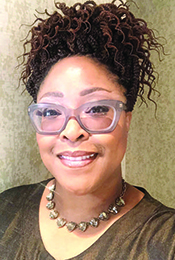
When we look across the landscape of colleges and universities as part of communities, engagement has become a primary way those within the institutions are making the most impact across the state. There are many needs across the sector of education; outreach and engagement are premier means through which Auburn University faculty are addressing those most pressing needs.
Engaged faculty at Auburn and the work done in partnership with the public, represent the best of what teaching, learning, research, service, outreach and extension can accomplish for greater societal good. We especially do this work so that students can be empowered to carry a value of engagement and lifelong learning throughout their lives.
So, what is engagement, really?
Recently at the Outreach and Engaged Scholarship Symposium, Laurie Van Egeren of Michigan State University and president of the Engagement Scholarship Consortium Board of Directors, reiterated terms and presented many types of outreach and engaged work that some might not associate with engagement, yet are very much defined examples of outreach and engagement produced here at Auburn.
She included community-based research, applied research, contractual research, demonstration projects, needs and assets assessments, program evaluations, translation of research scholarship through presentations, publication and websites, and exhibitions and performances as types.
Engaged teaching and learning included online and off-campus education, continuing education, occupational short course certificate and licensure programs, contract instructional programs, participatory curriculum development, non-credit classes and programs, conferences, seminars and workshops, educational enrichment programs for the public and alumni, service-learning, study abroad programs with engagement components as well. These are the many forms of engagement that faculty iterate as scholarship that qualifies Auburn as not only a Carnegie-designated research one institution, but also as a Carnegie-designated community engaged institution, which is congruent with Auburn’s land-grant heritage.
Auburn faculty engagement is action-based and driven by community partnerships. It is also equity-focused, and alongside cooperating agencies, organizations and groups in initiatives that build agency and create sustained collaborations, these engaged faculty impact the quality of life of people.
As part of the division of University Outreach, the Office of Faculty Engagement includes one of the best examples of outreach and engaged scholarship—the Encyclopedia of Alabama, a free online resource for all things Alabama.
The office focuses on faculty leadership development, engaged scholarship support and facilitates faculty cross disciplinary collaborations and partnerships with community. Over 300 Auburn faculty are engaged in sustained outreach projects, programs and initiatives representing various colleges and administrative and professional units. Van Egeren also reiterated core principles of outreach and engagement describing the work of engaged faculty at Auburn: collaborative, mutually beneficial, co-created, community driven, reciprocal and scholarly.
We, the faculty, are AU Engaged! These principles are evident in outreach and engaged scholarship, for it is through engagement that lives are impacted for the better and that is one way we are making a difference for a better world.
"Community engagement describes collaboration between institutions of higher education and their larger communities (local, regional/state, national, global) for the mutually beneficial exchange of knowledge and resources in a context of partnership and reciprocity. The purpose of community engagement is the partnership of college and university knowledge and resources with those of the public and private sectors to enrich scholarship, research and creative activity; enhance curriculum, teaching and learning; prepare educated, engaged citizens; strengthen democratic values and civic responsibility; address critical societal issues; and contribute to the public good."
Carnegie Foundation Elective Classifications - Community Engagement carnegieelectiveclassifications.org/the-2024-elective-classification-for-community-engagement
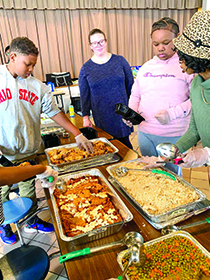
Young Professionals in Training, or YPiT, completed a successful first year of operation. The mentoring and tutoring program geared toward students in grades five through 12 was founded by Ja’Lia Taylor, a 2022 Auburn University graduate with a degree in special education and rehab counseling. Taylor sensed the need for students of color to have a program that equipped them with the necessities to graduate high school and become successful leaders within the community.
YPiT concluded year one with an inaugural end of the year celebration which included dinner and music on Aug. 5. During the celebration, YPiT recognized students’ achievements throughout the year, showcased their research on the importance of environmental sustainability and acknowledged their determination in becoming change agents within their communities. Additionally, YPiT spotlighted the advisory board members as well as mentors and staff.
In year two, YPiT will focus on being “Civically Engaged at Every Age” while analyzing the characteristics of what contributes to being a compassionate leader. The program is currently being overseen by Venus Hewing, coordinator of YPiT and manager within the Center for Educational Outreach and Engagement. Other members of the program’s leadership staff are Martina McGhee, curriculum developer; Shikia Carter graduate assistant program administrator, mentor and parent; Elizabeth Devore, mentor; Jailin Sanders, lead mentor; Tamarcus Milner, president of The Curtis House and partner and Taylor, founder and mentor.
YPiT thanks Taylor for the vision she had in founding the program and the hard work of others on the team who were integral in making the first year of the program. YPiT is committed to developing students into productive and successful leaders of tomorrow.
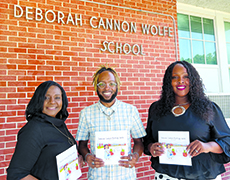
Auburn University students who participated in the 2021-22 Appalachian Teaching Project of the Appalachian Regional Commission learned about the life of Deborah Cannon Partridge Wolfe as part of their community development course with Mark Wilson and the Caroline Marshall Draughon Center for the Arts & Humanities in the College of Liberal Arts at Auburn University.
Copies of one product from the semester, a 24-page illustrated booklet on the life and work of Wolfe, was recently provided to the Town of Shorter and D.C. Wolfe Elementary for use at the school and throughout the community. Student James O’Brien wrote the majority of the text.
Born in Cranford, New Jersey, in 1916, Deborah Cannon graduated from Columbia University and moved to Macon County to work at Tuskegee Institute and at schools in the county, including Prairie Farms, for several years. Later in life, following a productive career that included work at Queens College in New York and the U.S. House of Representatives, Wolfe reflected in an interview that her time working in rural Alabama was formative in her development as an educator and advocate for education.
The booklet, illustrated by artist Laura Murray, tells Wolfe’s story in the first person at a second-grade reading level and includes historic photographs.
“We were honored to work on this project with Deborah Wolfe’s son, Dr. Roy Partridge Jr.,” said Wilson, director of the Draughon Center, “and students in the course found his mother to be an inspiring leader with a unique and important story to tell.”
“I am thrilled to have the opportunity to inspire future leaders of Alabama schools with the true to life story of our school’s very first leader,” said TriShonne Cornelius, Principal of the D.C. Wolfe School. “I am thankful for Dr. Wilson’s vision and the Auburn University students who worked tirelessly to bring her story alive through wonderful illustrations, actual portraits and an easy-to-follow storyline for all students to enjoy. This is an example of the great things that can happen when schools, parents, local communities and universities partner in the education of children. Together, we can ensure each child succeeds!”
“I think this book is amazing,” said Town of Shorter Mayor Willie Mae Powell. “I love the art, as well as the detailed information on the life of Deborah Cannon Partridge Wolfe. I know the students will enjoy reading this book. We are thankful to everyone who participated in this project for giving everyone who has attended Deborah Cannon Wolfe something to be proud of, both children and adults.”
Copies of the books will be distributed for student use at D.C. Wolfe Elementary School and available for purchase as a fundraiser for student programs. An online version of the book can be found at aub.ie/dcwolfe

Service programs at Auburn help students develop and explore their leadership skills while serving the campus, community, state and beyond through a variety of programming and service opportunities.
An annual event to unite student service organizations, Give Back on the Green brought 334 Auburn students together to collaborate with the Boys & Girls Clubs of Greater Lee County.
Held on Aug. 31, the Student Involvement sponsored event drew participants from Alternative Student Breaks, Auburn Dance Marathon, Beat Bama Food Drive, IMPACT and The BIG Event.
For Give Back on the Green, Auburn students–with help from Aubie the Tiger—assembled resource kits consisting of academic enrichment activities, words of affirmation and encouragement, and a fun token for the children at the club. DJs from WEGL 91.1 FM provided entertainment, and the University Program Council helped raise awareness for the event.
“Being part of an organization and event like this is the true embodiment of the ‘human touch’ that we hold so dearly at Auburn. Giving to a part of the community that we do not usually reach was such a great honor,” Beat Bama Food Drive president Paige Hall said.
Service Programs at Auburn help students develop and explore their leadership skills while serving the campus, community, state and beyond through a variety of programming and service opportunities. By supporting the Boys & Girls Club through the event, Auburn students helped further the organization’s work to provide safe development and engagement opportunities for adolescents.

For a group of nearly 20 promising high school students interested in pursuing futures in neuroscience and medical fields, the Auburn University Brain Camp, or AUBC, was an experience they won’t soon forget.
Nineteen accomplished high school students from throughout Alabama and across the nation gathered at Auburn University July 17-22 for a one-of-a-kind immersive experience that left a lasting impression.
Led by Department of Psychological Sciences Professors Jennifer Robinson and Jeff Katz and Auburn High School teacher Kathy Dodgen, AUBC provided opportunities for students to scan and analyze their brains using magnetic resonance imaging (MRI), perform dissections in a university biology lab, learn about cutting-edge research with investigators from Canine Performance Sciences and experience neuroscience research methods such as electroencephalography, or EEG, in the School of Kinesiology. Students also attended presentations by second-year medical students at the Edward Via College of Osteopathic Medicine, or VCOM, involving cadavers and learned about raptors’ brain functions during a special visit by a representative from the raptor center.
The variety of applications and illustrations of neuroscience’s reach was paramount, and students benefited from the hands-on and immersive camp.
“I love being a part of it, and every year, I learn something different,” said Robinson, who joined Auburn’s Department of Psychological Sciences in 2012. “There are a lot of really cool things we try to show the students from different perspectives and angles, hoping they will understand the gravity of how magnificent our brains are, how adaptive of an organ it is and that, while it may look similar across species, it operates very differently and is specifically tailored to each animal.”
This summer’s camp flourished thanks to partnerships with several groups, departments and colleges, including Auburn Youth Programs, or AYP, the Auburn University MRI Research Center in the Samuel Ginn College of Engineering, Department of Biological Sciences in the College of Sciences and Mathematics, the School of Kinesiology in the College of Education and the College of Veterinary Medicine, home to both the Southeastern Raptor Center and the Canine Performance Sciences group.
“Something I think is pretty remarkable about our camp is that we have folks who volunteer their time, their resources, their lab space and their materials, and that is very humbling that they’re willing to do that for our camp,” Robinson said. “We couldn’t do it without them, so we’re extraordinarily lucky to have such strong support from faculty, departments and colleges across campus. I think it really goes to show just how interdisciplinary neuroscience is, and we hope that is one of the takeaways from our camp. It certainly takes a village to decipher the brain, and the more lenses and approaches we take, the closer we’ll get.”
Not only were students able to experience a wide array of experiments and exercises, but they were immersed in campus life. Most of the campers stayed overnight in Auburn’s dormitories, enjoyed meals at campus dining facilities, and participated in evening social and recreational activities. Auburn Youth Programs staff and counselors planned daily activities for the students that included everything from a movie night and visit to the James E. Martin Aquatics Center to a stop at Toomer’s Corner and tour of downtown Auburn.
The camp was buoyed by nearly $28,000 in donations from the 2022 Tiger Giving Day in February, which allowed Robinson to purchase new laptop computers for the students to utilize during their weeklong visit to the Plains. The Birmingham-based Medical Properties Trust—which has supported the camp for several years by providing financial support for the campers’ brain scans—matched donations to help push the fundraising effort, and the generosity of the Auburn Family gave Auburn Brain Camp a big boost that allowed organizers to minimize costs for attendees.
“It really expanded what we could show them and what they could engage with,” Robinson said. “From a technology standpoint, that put us on different footing and elevated the experience for our campers because we could walk them through how to analyze their own brain data.”
Often times, the camp has become a springboard for participants to go on to enriched college experiences at Auburn and other universities before progressing to fulfilling careers in the neurosciences or related fields.
Seeing students take advantage of the opportunities and use them to propel their lives and careers is a particularly rewarding aspect of the camp for Robinson.
“These kids are so brilliant, and that in and of itself is really a wonderful experience, to just hear the thoughts in their minds,” Robinson said. “It just makes my heart swell that they’re already thinking about so many high-level issues and they’re motivated and passionate about making a difference and using this knowledge to advance our health and our wellness.
“The future is in good hands.”
Learn more about AU Brain Camp by visiting the Auburn Youth Programs website at auburn.edu/summercamps. AYP, offered through the Office of Professional and Continuing Education (OPCE), is an extension of University Outreach that sponsors and executes a variety of summer programs designed to educate and inspire youth. AYP exists to promote educational and enjoyable summer programs to empower youth to find their passion, strengthen skills, and shape their future.
Each year, Auburn University receives nominations for the Excellence in Faculty Outreach award. Based on the collective accomplishments among this year’s nominees, the selection committee recognized these faculty with honorable mentions. Their accomplishments are noteworthy, and their heart for outreach, public service and community engagement is inspiring.

For more than a decade, Sean Forbes has worked tirelessly to establish and sustain O Grows, a community-university partnership drawing on the resources and commitment of Auburn University, the City of Opelika and Opelika City Schools. The partnership’s focus is leveraging community resources and relationships to enhance educational efforts and improve food security. During this time, O Grows has become the touchstone for Forbes’ academic life, giving shape to his work across the four missions of the university: outreach, teaching, research and service.
O Grows has become the vehicle through which Forbes engages and supports PK-12 students and teachers in Opelika City Schools, preservice teachers enrolled in teacher certification programs across the College of Education and doctoral students who aspire to be educators and community leaders. It is also the vehicle through which he conducts and facilitates research and offers meaningful service to the community in and around the university.
Forbes, professor of educational psychology, leverages the resources and opportunities of O Grows to support preservice and practicing educators’ knowledge of and responsiveness to student development, learning and motivation. That understanding is essential to the work of all teachers. In the spaces, curriculum and pedagogies available because of O Grows, Forbes models an interdisciplinary approach to teaching, connecting core academic standards to agricultural, entrepreneurial, and performing and visual arts concepts.
Students benefit from the rigor of this approach and from the universal relevance of food systems, food security and food business. They also benefit from the relationships built with teachers, university students and faculty and community members in the shared learning and labor that happens in the gardens, greenhouses and farmers market sponsored by O Grows.
The impacts of Forbes’ work across multiple levels of education should not be overlooked. To date, thousands of public school children and adolescents have had the opportunity to learn academic content via their interactions in O Grows spaces. Their learning is further enhanced by the inclusion of their families and communities in O Grows programming. There is broad consensus in the literature that family and community engagement is connected to improved student academic, affective and social outcomes. O Grows provides spaces and scaffolding for students to engage with their families and neighbors in mastering math, science, social studies, arts and literature concepts alongside agriscience, nutrition and sustainability content. For this reason alone, Forbes’ efforts are worthy of commendation.
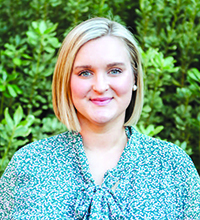
College of Architecture, Design and Construction Lauren Redden has consistently applied her disciplinary expertise to the direct benefit of local and regional communities with a remarkably high degree of success. Redden’s leadership in effectively integrating outreach into the student experience at the McWhorter School of Building Science falls into two general areas: the development and implementation of service-learning and study-beyond programs related to regional disaster recovery efforts and the recruitment of women of diverse backgrounds into the field of construction management.
Redden has led groups of students to participate in numerous post-disaster reconstruction efforts in Houston, Texas, after Hurricane Harvey, the Florida Panhandle after Hurricane Michael and Lee County, Alabama after the devastating Beauregard tornadoes. These efforts have incorporated several aspects of post-disaster recovery, from damage assessment and debris removal to the rebuilding of damaged homes.
Other outreach projects with students have included the restoration of a community center for veterans in Tuskegee, as well as collaboration on projects for the Lee County Humane Society, the Alabama Rural Ministry and the Auburn-Opelika chapter of Habitat for Humanity. To organize and successfully carry out these projects, Redden has worked tirelessly with community partners and volunteers, non-profit organizations, local businesses and churches.
Traditionally very few women have chosen to go into the construction industry. Redden has a commitment to change this by actively recruiting women into construction-related careers. Since 2019, she has single-handedly organized highly successful summer camps for young women from high schools and communities around the country. To date, she has held four of these camps stopping not even for the pandemic, during which she offered camp remotely.
To make these programs successful and highly impactful, Redden has worked tirelessly with industry and community stakeholders and partners, and is committed to recruiting as diverse a group of women as possible into our program and thus into the construction industry at large.
The McWhorter School of Building Science offers the only construction program in the country where service-learning is a required part of the curriculum. Study-beyond outreach opportunities are also an integral part of the program. Redden is one of the school’s most dedicated and effective faculty members at promoting, developing and ensuring the impact and the success of this outreach-based mission. Her teaching, research and outreach activities are all directly compatible with the college’s mission and commitment—which extend across all programs—to hands-on, community and place-based learning. Redden is one of the most consistent, effective, committed and compelling community-oriented educators in the college.

Cheryl Seals is an exuberant advocate for inclusion, equity, outreach and engaged scholarship. A portion of her mission is to support University Outreach to provide greater inclusion of students in STEM in computing disciplines.
She has worked to address underserved communities in computer science and STEM. Her objectives are to reach underserved populations that may not have the resources, exposure or access to technology and computing education. Seals has engaged in a wide range of opportunities for K-12 students, undergraduate and graduate students. Her target audience has been all students, but specifically those underrepresented in technology. In Alabama, she has targeted blackbelt communities and underrepresented students and women nationally through regional, state and national audiences.
Seals has always been involved in university and community outreach. While matriculating at Virginia Tech as a graduate student, she served as an outreach teacher of computer science for a TRIO program, Upward Bound, which provides pre-college opportunities for traditionally underrepresented or low-income families. In collaboration with her sorority, Delta Sigma Theta Sorority, Inc., Seals supported a community after-school tutoring program and Delta Academy outreach for girls.
Seals has nearly 20 years of experience at Auburn’s Samuel Ginn College of Engineering in computer science and software engineering and has been actively involved in her outreach mission every year. As a new professor, she began supporting and mentoring undergraduate student researchers each semester and supporting summer researchers beginning with DREU. Today, she continues this practice of actively supporting undergraduate researchers while providing community support.

Last fall, Auburn University Outreach Global organized a meeting of Auburn faculty and staff with a history of or an interest in collaborating with partners in Liberia, West Africa. During the meeting, participants from various departments across Auburn University shared information about their expertise and areas of impact, including Felicia Tuggle, professor of social work, and Mollie Smith, outreach programs coordinator for aquaponics in the department of horticulture. This meeting established the groundwork for a subsequent partnership.
Following the meeting, a request was made by African Methodist Episcopal University, or AMEU, a partner organization located in Monrovia, Liberia. During their internship, AMEU social work students observed malnourished children at the internship site and felt the need to intervene in a sustainable and transformational way. The students started a Universities Fighting World Hunger (UFWH) chapter and invited faculty and staff at Auburn to help them address hunger and poverty in a way that improves the quality of life for Liberians. Auburn University is the flagship school for UFWH organizations.
The AMEU students targeted the community of Westpoint in the capital city of Monrovia, Liberia, for action designed to prevent malnutrition and food insecurity. The students researched viable food production systems and settled on aquaponics as a sustainable solution for the community. Tuggle made a request to find someone at Auburn with knowledge and experience in aquaponics. Fortunately, Smith had also been present at the initial meeting, and therefore was known to Tuggle. The outcome of the partnership between Tuggle and Smith created the Integrated Aquaculture for Food Production, Education, Empowerment, and Development, or iFEED.
iFEED is a transdisciplinary social action initiative that leverages the disciplines of agriculture and social work to accelerate action on sustainable development goals specifically as they relate to reducing poverty and hunger, promoting good health and well-being and quality education in ways that provide decent work and economic growth and reduce inequalities.
In practice and implementation, iFEED hosted a teacher training for science and math teachers using aquaculture and aquaponics as the subject matter.
Over the course of four days, Tuggle and Smith trained 22 public school teachers in aquaculture and aquaponics. The training covered basic aquaculture and aquaponic principles, including hands-on training in building a desktop aquaponics system culminating with a full-day field trip to one of Liberia’s three National Fish Hatcheries and a private recirculating aquaculture farm. The training was accompanied by a training manual which included copies of the presentations given that day, lesson plans developed by Auburn University School of Fisheries, Aquaculture, and Aquatic Sciences’ education extension specialist, David Cline, and several publicly available aquaponics curricula.
Tuggle used pre- and post-test evaluation tools to measure the effectiveness of the training on knowledge uptake. Future trainings are planned as are further methods to evaluate the trainings’ impact on the teachers themselves, the school children they teach and the community to which the children belong.
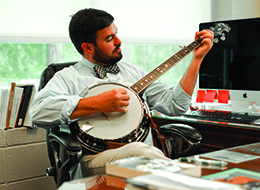
“How on Earth did you come up with this subject, out of everything you could have studied?”
That was a question an audience member asked historian Matthew Downs following his presentation on prohibition in Birmingham between 1907 and 1915 at the Alabama Department of Archives and History in September.
“How did I get to this?” said Downs. “I wrote an article on prohibition for the Encyclopedia of Alabama.”
The dean of the College of Arts and Sciences at the University of Mobile went on to describe several reasons he was interested in this period of Alabama history. He also noted after he wrote the prohibition entry for the Encyclopedia of Alabama, he made a presentation on the topic, and was then invited to write an article for Alabama Heritage Magazine.
When the online EOA officially launched in September 2008, there were assumptions that not only would the site be a welcomed source of information on its own merit, but it would also encourage additional scholarship and research.
Fourteen years later there is much evidence that those expectations were well founded, and Downs’ work as a professor and scholar is one example.
In a letter of appreciation, sent to EOA several months before his presentation in Montgomery, Downs described how he used the site in both the classroom and for his own research.
“I regularly have my students access and refer to the Encyclopedia because I know it to be well-researched, well-documented, and routinely updated to reflect the state of the field,” said Downs. “Many of my students would struggle to afford an expensive textbook on the topic, and so I frequently direct them to the EOA as a supplement to course material.”
Additionally, Downs noted that during a recent semester, his students conducted individual research to write encyclopedia-style entries modeled after those found in EOA. He reported that the students found the experience rewarding and is one of several professors at institutions across the state who give research and writing assignments that might be considered an EOA entry.
Downs, who serves as editor of The Alabama Review and was the winner of 2015 James F. Sulzby Award, presented by the Alabama Historical Association, for his book Transforming the South: Federal Development in the Tennessee Valley 1915- 1960, also uses EOA in his own research.
“I have routinely referred to articles in the encyclopedia as a means of bringing broader context to specific questions,” he said. “The fact that the articles are as useful to me, a professional historian, as they are to my students—not to mention students at secondary and elementary schools across the world—suggests both scholarly rigor and accessible writing, a testament to the authors and to the editorial staff that has created such a consistent body of work.”
The letter of appreciation from a professor at a small liberal arts college echoed a sentiment EOA’s staff and supporters have heard over the years: “I have found it to be a truly invaluable resource for those of us dedicated to the study of Alabama history.”
Visit EncyclopediaofAlabama.org to read Matthew Downs entry of prohibition in Alabama.
The Encyclopedia of Alabama is a free, online reference resource on Alabama’s history, culture, geography and natural environment. The site offers articles on Alabama’s people, events, sports, art, literature, industry, government, plant and animal life, agriculture, recreation and so much more. EOA was developed by the Alabama Humanities Foundation (now Alabama Humanities Alliance) and Auburn University with generous financial support from across the state. Auburn University hosts EOA’s editorial office through the division of University Outreach’s Office of Faculty Engagement, in partnership with Auburn University Libraries and the Office of Information Technology.
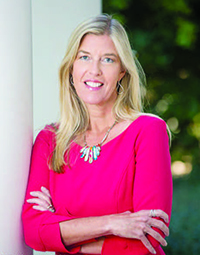
The Office of Public Service was awarded a $60,000 grant from the Financial Health Network’s Financial Lab Solutions to perform a system mapping of the Alabama Department of Corrections’ current process for incarcerated individuals to obtain a government- issued identification.
In collaboration with Alabama Appleseed Center for Law and Justice, the FHN identified IDs as a barrier to establishing bank accounts, applying for housing and employment, seeking medical treatment and fully integrating into mainstream society.
At the inception of this project, the state of Alabama passed Alabama Act 2021-459, mandating the collaboration of Alabama Law Enforcement Agency and Alabama Department of Corrections, to provide identifications to individuals who are incarcerated.
This initiative was led by Hollie Cost, assistant vice president for the Office of Public Service and University Outreach and Tori Ho, former graduate assistant for the Office of Public Service.
Prior to the system mapping, Ho benchmarked all 50 states to identify success stories and processes that could be replicated in the state of Alabama, with the understanding that operations vary from state to state.
After researching ID programs and processes, two notable processes of interest came from the states of Ohio and Kentucky. Ohio, with approval from their respective state agencies, provides inmates with release cards as sufficient documentation to exchange for a nondriver’s ID, driver’s license, or learner’s permit. Kentucky, through community-based and state agency partnership, issues IDs at institution sites using mobile units with the same functions as regional licensing offices.
With the legislation in mind, it was important to propose collaboration with the necessary partners. Alabama Act 2021-459 mandated two agencies to collaborate on an ID process for incarcerated individuals. The legislation explicitly stated ADOC shall provide the minimum documentation for identification, including a social security card and birth certificate, necessary for employment, and ADOC in collaboration with ALEA shall assist an inmate in obtaining a non-driver identification card.
Cost and Ho initiated introductory meetings with key stakeholders and supporting organizations— ADOC, ALEA, Alabama Department of Public Health, Department of Youth Services and Shelby County Sheriff’s Office—to gain understanding of each agency’s mission and to promote collaboration. All agencies convened to share their institutional knowledge and concluded there was no process to secure IDs for their population. Additionally, it was stated that prior and current collaboration between the agencies did not exist.
The David Mathews Center continued to facilitate two additional convenings including impacted individuals and reentry organizations to share their experiences as justice-involved individuals or someone who assists formerly incarcerated individuals in securing an ID.
Collectively, all parties identified various barriers including: obtaining the proper documentation necessary to apply for an ID, the cost for an ID and necessary documents, the accounting processes to purchase ID cards, transporting incarcerated individuals to ALEA issuing offices, providing space to store individuals’ property, providing education regarding the importance of identification and designating and training personnel within each facility to oversee the ID process and to assist individuals
After identifying these barriers, partners agreed upon potential opportunities to move forward with implementing an ID process and developing a new pathway to secure IDs.
The favored opportunity was utilizing ALEA’s portable and mobile unit ID equipment at institution sites. The equipment has the same capabilities of a stationed ALEA licensing office. This option removes the barrier of transporting individuals to offices and assists with the security of these individuals. With the help of DMC, a proposed pathway was developed using the feedback and knowledge shared during meetings.
Proposed pathways were developed for the pilot implementation of securing IDs. The pathway required collaboration between the correctional institution and ALEA for ID issuance and collaboration between the correctional institution and ADPH to request birth certificates. The differing demographics of each population necessitated specific and separate pathways for each of the three institutions.
To implement the pathway, participation from each institution was necessary. The proposed project called for 10 to 30 individuals total, allowing for each entity to identify 10 participants. Trusted individuals were identified by stakeholders as personnel overseeing the pilot program and point of contact between partners. A training was conducted before implementation to verify processes, expectations and roles.
With these action items completed, the pathway was ready. The pilot program was proposed to include the following: program orientation, program meetings, final checklist and ID issuance.
Pathway modifications were expected throughout the pilot to ensure operations were smooth and aligned with the agency’s current operations. Challenges were identified amongst agencies including interagency transfers, population turnover and the withdrawal of the ADOC. The withdrawal did not affect the desired outcome as nondriver’s IDs were obtained for the incarcerated population; however, an agency that was mandated to secure the IDs did not do so in this project.
Results of the system mapping and pilot program include 43 IDs issued to DYS and SCSO participants, reaching 143% of project goal.
Previously nonexistent interagency collaboration was established between all agencies. The DYS has now integrated securing an ID for youth as part of their commitment process. The SCSO now partners with the Dannon project to secure IDs for their jail population.
One major takeaway from this project is by securing IDs early, the trajectory of an individual’s life may have changed for the better. With an ID, individuals can open banking accounts, apply for employment, housing and post-secondary education. Importantly, facilitating dialogue between critical agencies and impacted individuals results in systematic improvements that can impact generations.

More than 5,000 miles away from “the loveliest village on the Plains,” Brittany Branyon had a life-changing moment only dreamed about by most university educators and students.
The doctoral student and mother of two was busy working with Auburn University Department of Political Science Associate Professors Kelly Krawczyk and Bridgett King as part of a group of graduate students on a weeklong study abroad trip to the capital city of Monrovia, Liberia, when she experienced an “Aha” moment. Branyon—who earned her bachelor’s in political science from Auburn and a master’s in international relations from the University of Oklahoma—was helping teach a group of students from the Gbowee Peace Foundation Africa when her future goals as an academic and professional advocate became crystal clear.
“In that moment, everything came full circle,” said Branyon, whose doctorate will be in public administration and public policy. “From seeing and reading about the civil war that was happening in Liberia years ago and the women like [Nobel Laureate] Leymah Gbowee who made such a difference, to being there talking with these women—we were teaching them, but they could have been teaching us.
“I thought, ‘I’ve got to come back, I’ve got to keep doing this. There’s got to be a way.’ I think I emailed [Krawczyk] that day and said, ‘I don’t know how I can keep doing this, but I need you to teach me how.’”
Krawczyk has been taking Auburn University students to African nations as the study abroad element of the Master of Public Administration and joint Public Administration and Public Policy doctoral program for seven years. This summer’s trip—which took place June 18-27—was part of the Public Administration, Civil Society & Democracy course.
The course was structured around the three legs of academia—teaching, research and outreach. Students led classroom instruction, delivered training workshops, collaborated on ongoing research projects and conducted focus groups with participating constituents.
Auburn’s group was tasked with developing curriculum that helped provide instruction for nearly 50 students from African Methodist Episcopal University, or AMEU, and the University of Liberia. The Auburn students facilitated and implemented a qualitative field research short course for undergraduates on site at AMEU.
Auburn students also designed and delivered capacity-building trainings to Liberian civil society organizations, including a training program in advocacy, community mobilization and social justice for the Gbowee Peace Foundation Africa and a marketing and resource development workshop for the non-governmental organization, or NGO, Hope Alliance Liberia.
As part of the qualitative research course, Auburn students also wrote a 70-page, self-contained course manual, another 40-page training manual and took the lead on the program’s implementation of the trip’s objectives. The dozens of Liberian students who participated received course completion certificates, and faculty and leaders from the Liberian universities also attended and participated in the classes.
“They learned a lot about best practices and then actually went out and did it, and I think they learned how things can happen in the field and how you have to adapt and be flexible,” Krawczyk said. “This course is designed to be all experiential learning, and students have gained real-world, applied, global experience that they can then list on their resumes. The students did all of it—they designed it and implemented it, and we just supervised.”
The chief aim of Auburn’s visit was to develop and implement international service learning activities, and the group decided along with the university to focus on delivering a qualitative methods short course, as well as on producing and delivering training workshops and social media content for the NGOs.
“They did an amazing job and created this whole plan when we got to the school to create three different marketing videos that would be suitable for their website and social media,” Krawczyk said.
“One is a historical 30-second video about the school, its founder, its development and what the mission of the school is. The second video is going to be kind of a fundraising video, and the third video will be about an adopt-a-student program they were helping move forward. They did all of that, did interviews and took video while we were there, and the school’s students and staff were in the videos.”
Another of Auburn’s contingent, doctoral student Elena Roversi, jumped at the chance to participate in the excursion.
“I’ve always dreamed about being a good actor in society,” said Roversi, who has worked with UNICEF in Senegal. “I think you can change people’s lives in different ways, and one of those is what we did in Liberia. It was more about trying to strengthen the universities there, helping the students decide what’s best for them and giving them knowledge so they can have more opportunities and options.
“It was good that we could share what Auburn, and particularly our program, could offer them. I really enjoyed my time there, and the people were incredible.”
Making a longstanding impact
Krawczyk has spearheaded Auburn’s program and established roots in numerous West African countries during her tenure, traveling with students to Nigeria, Ghana and South Africa in addition to Liberia. Each trip is different, with specific goals and designs in mind.
“We tailor it each time to the students in the course and the country case study,” Krawczyk said.
King, a scholar who frequently studies elections in developing democracies like Liberia, also was excited to make the trip along with a half-dozen graduate students.
“It was interesting and exciting to see them taking ownership of the curriculum and its instruction in a new environment they weren’t familiar with,” said King, who directs the College of Liberal Arts’ political science public administration program. “I appreciated the cultural awareness and competency lens they used to approach the instruction for the students.
“The Auburn students really embraced the experience we took them on full force. They really had no idea what they were getting into beyond, ‘We’re getting on a plane, we’re going to teach and deliver curriculum.’ The openness and awareness with which they approached all of the things we did I appreciated, and I think the university and NGOs in Liberia did as well.”
The collaboration was an equal and beneficial exchange of learning opportunities and ideas.
“The interaction with the students and their ideas was very fulfilling since they were sharing their life experiences with us,” said Roversi, who is co-authoring a paper about feminist perspectives in Liberia with Branyon. “These types of programs and experiences are really important for universities like Auburn to provide for students. I really liked the exchange with the students [at AMEU].”
Branyon said the Auburn team found the Liberian students and NGO representatives to be eager to learn and excited to broaden their knowledge base.
“They’re already advocating for their causes but are just trying to fine-tune things,” Branyon said. “It almost feels like advocacy and community mobilization is in their blood because their democracy is so new and they have actively fought for what they have. They’re also very hungry for communications, marketing and fundraising support and learning how to do that, both at the grassroots level, but also for donors who may be interested.”
Krawczyk said this summer’s trip had an immediate impact on the Liberian students and organizations.
“The NGO is already using the training materials,” she said. “They’re soliciting local donors to help extend their adopt-a-student program, are looking at creating community work and service days and are taking all sorts of ideas that were generated during the training and putting them into action.”
Before the trip, Auburn’s group also organized an educational supply drive, where they took new and used donated educational materials—workbooks, classroom books, puzzles, games, markers, pencils, even a talking globe—and worked with the local Auburn nonprofit, Oslyn Rodriguez’s Backpack International, that provides backpacks filled with supplies to schools around the world. The partnership produced 70 backpacks filled with supplies that the group delivered from Auburn to Liberia for students to utilize this fall.
“We traveled with 18 suitcases, and we left nine of them there,” Krawczyk said.
Seminal experience for all
The program’s 10-day trip had a profound impact on all who were part of the collaborative effort.
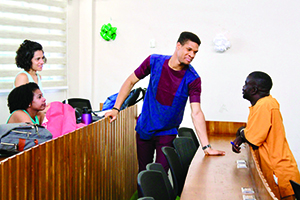
“I think it went great,” Krawczyk said. “This particular iteration of the class was absolutely the most successful, in terms of international service learning, experiential learning and providing opportunities for students to really to go out there and do the things related to teaching, research and service. I think we provided real-world opportunities for the Auburn students.
“You can plan and know best practices and guidelines for how you would implement all of these things, but having to do it in the field is always different. So, I think we gave them some real opportunities to actually do this kind of work.”
The benefits to the Liberian universities were profound.
“This workshop was so clear in its teaching, and the facilitators were knowledgeable and patient with the students,” said Sylvestine Gbessagee, chair of social work, African Methodist Episcopal University. “The students and faculty, as well as I, enjoyed the training workshop in a topic that we all felt was difficult. Having a workbook was an added advantage to the students taking research classes and faculty teaching research.
“Having a training manual was an added advantage in that they all had a working tool to use then and in the future.”
Hope Alliance Academy Founder and Executive Director Benedict Quato was effusive with praise for the Auburn program. “Our collaboration with Auburn University and its programs has impacted our programs in many important ways since we established contact with Dr. Kelly Krawczyk in 2015,” Quato said. “The collaboration has brought us financial stability through fundraisers and donations toward key program areas. Through the regular capacity development trainings by Dr. Krawczyk, Dr. Bridgett King and their MPA and Ph.D. students, our team is stronger in programming and fundraising. Our adopt-a-student campaign, which is largely supported through this collaboration, is keeping 10 kids from underprivileged families at our school in Johnsonville.
“This collaboration has also empowered us with needed books and school supplies to improve our youth development and education programs in Liberia. The collaboration has made Hope Alliance Liberia a better organization, and we anticipate a long-term collaboration going into the future. It has truly been a blessing.”
Because of the momentum and impact from the program’s work in Africa, the Department of Political Science added a graduate certificate in Global Public Service at the beginning of fall semester.
For Krawczyk, the experience this June served as a reminder of why she works so hard to make the program a success.
“It absolutely affirms why I’m doing what I’m doing,” Krawczyk said. “We’ve gone from the first iteration of this class in Liberia—when I took four students and we did international election observation on our own as Auburn University as an entity—to having an established relationship and an open invitation with an institution of higher education, as well as an established partnership with several NGOs.
“So, each time we go, we’re building that relationship and are able to take on new opportunities and new work because we’re not having to start from Ground Zero in building those relationships and making those contacts. We’re already talking about what we’re doing next and when we’ll come back. The opportunities become endless.”
King couldn’t be happier with the results.
“We did all the things we set out to do,” King said. “One of the amazing things about teaching these classes is that, once you take the students somewhere once, they want to go everywhere. They recognize beyond what we could communicate to them in class what it is their futures and careers as academics, policy or administration professionals who work in government or non-governmental organizations can actually look like.”
Roversi was able to broaden her horizons through the course.
“As a student, it gave me the opportunity of discovering a place I wouldn’t necessarily go by myself,” Roversi said. “I never imagined I would go to Liberia and try to test my skills, both in interacting with people who have a different background and culture and also teaching. I think it’s definitely something that everyone should do.”
It was an experience Branyon says changed the trajectory of her future.
“It completely changed my life,” said Branyon, who hopes to work with the U.S. State Department or an NGO after completing her doctorate. “I always knew I was interested in things like this, and I’m so grateful to Dr. Krawczyk and Dr King for believing in me and bringing me along. I can’t imagine my life without that experience.
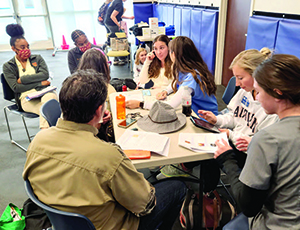
The Auburn University departments of Kinesiology, Speech-Language Pathology, Audiology and Social Work collaborated with the Tuskegee University Department of Occupational Therapy and the Alabama Head Injury Foundation to host the Traumatic Brain Injury Bright Ideas Camp.
The Alabama Head Injury Foundation, or AHIF, provides a wide variety of services for traumatic brain injury, or TBI, survivors. The Bright Ideas Camp offered 14 TBI survivors and their care partners the opportunity to collaborate with an interdisciplinary team of student clinicians and faculty to attend seminars on nutrition and mindfulness and avail themselves to resources available through AHIF.
“It is our hope that by participating in this camp, the individuals feel valued, encouraged by their strengths and motivated to try new things to help residual difficulties,” said Laura Willis, a clinical professor and the Speech-Language Pathology clinical coordinator.
The camp allowed graduate clinicians to complete an initial assessment of participants, gain an understanding of each camper’s current abilities and recommend a plan of care to be followed once the individual returned home. Most participants were not currently receiving services, so the team of clinicians provided individualized exercises and strategies to encourage continued progress.
Participants elected to be involved in the program for several reasons. Common reasons included barriers to getting the evaluation and/or treatment needed due to COVID-19 restrictions, insurance issues, time since injury or the lack of transportation to appointments.
The camp provided participants an opportunity to receive professional recommendations, but it also provided an opportunity to discuss feelings of isolation and loneliness. The camp addresses empowerment and support for the campers and provided a safe space to share feelings about their experiences. Willis shared that, “Over the past few years of participating, I have been overwhelmed by the perseverance, wisdom and resilient attitudes of the campers.”
The Alabama Head Injury Foundation, a nonprofit organization focused on improving the quality of life for those who have survived a traumatic brain injury and their care partners, facilitated the camp. More than 10,000 individuals sustain a traumatic brain injury in Alabama each year, according to their website, and AHIF focuses on helping in any way that they can.
While the Bright Ideas Camp primarily focuses on functional strategies and changes for the camper to utilize, AHIF also emphasizes independence and self-advocacy. Seminars focused on opportunities through AHIF such as camps, counseling services and support groups for both the individual with TBI and their caregiver. AHIF support staff collaborated with the students and faculty to understand specific needs of the participants and ensure recommendations were completed after the camp ended.
Auburn University’s partnership with the Alabama Head Injury Foundation has benefited its students by providing them the opportunity to interact with other professionals and learn about resources for future practice with this population. Kathleen Lea, an assistant clinical professor for the Auburn University Audiology program, stated that, “This was a perfect environment for encouraging networking of students from multiple disciplines across multiple universities for serving a special population.”
Many students did not have previous experience working with individuals with traumatic brain injuries and assisting other professions in their assessments, and the camp provided a valuable learning opportunity for them. Understanding how to work effectively and collaboratively as a team is crucial for all the disciplines involved. The camp allowed students to better understand this dynamic relationship they had learned about in the classroom.
Willis believes this camp, “is a unique opportunity to intersect experiential learning for graduate students while serving members of our community.”
Students had the opportunity to gain experience from their camper while also interacting with an interdisciplinary team. The mission statement of the Auburn University Speech, Language and Hearing Sciences department focuses on creating clinicians who “compassionately serve and advocate for individuals with communication needs in the local, national and global communities.”
This camp represents only one of the varieties of interdisciplinary opportunities that the Speech, Language and Hearing Sciences department provides to its students. Students also gained valuable experience by forming relationships with their respective camper.
Kaki Holcek, a Speech-Language Pathology graduate student, shared her camper gave her “such a different perspective when working with people who have experienced a TBI. I really admired his positivity even after experiencing something so life-altering.” She continued that this experience taught her to “never judge a book by its cover, especially as someone working in a healthcare profession. You may think you know what a patient’s concerns are coming in, but it is so important to ask the right questions and to really listen to what they are telling you.”
Each student had a unique opportunity through participating in the camp, and this experience will continue to inform their future practice.
To learn more about speech-language pathology or audiology services, contact the Auburn University Speech and Hearing Clinic at (334) 844-9600 or visit aushc.org.
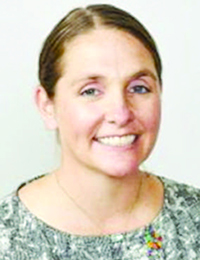
Graduate research assistant with the Office of Faculty Engagement and Encyclopedia of Alabama Gail Harper Yeilding has been invited to participate in a U.S. Department of Education Fulbright Hays project, titled “Teach Ag Uganda: Achieving the UN SDGS Together,” in Lira, Uganda in July 2023.
Through Penn State University’s Global Teach Ag Network and a partnership with Fields of Hope, participants will work alongside Ugandan teachers to implement a food security education curriculum to explore food security at the intersection of culture, education and agriculture systems.
Yeilding, a doctoral candidate in English education, co-wrote an English Language Arts curriculum focused on Sustainable Development Goal 2: Zero Hunger, called Learning Through Storytelling with scholar-in- residence Roger Thurow based on his books, Enough, The Last Hunger Season and The First 1,000 Days.
As an extension of her interest and work with this ELA curriculum, she will be a teacher trainer, implementing a curriculum with the objectives of increasing the global competence of participating educators, focusing on the integration of international studies and food security education in secondary classrooms.
As a part of the Office of Faculty Engagement and University Outreach, Yeilding will assist with updating census data for the Encyclopedia of Alabama and developing 2023 teacher workshop programming for using Encyclopedia of Alabama content in the classroom. She will receive support from Penn State, Auburn’s Office of International Programs and Auburn’s Graduate School to travel to Uganda.
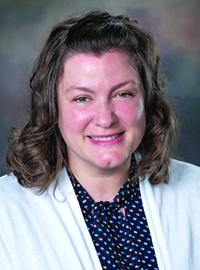
Stefanie Delaney recently joined the staff of the Government and Economic Development Institute serving as the training department registrar for professional development and certification programs. In this role she assists course participants with registration, billing and transcripts. Delaney moved to the area in the summer of 2021 with her husband and two children from the Philadelphia region, where she worked as the operations manager at the Haverford College Bookstore. She worked as an administrative associate with the Finger Lakes Land Trust in Ithaca, New York. Since relocating, the Delaney family has embraced the beauty of the Auburn community and its sports culture. Delaney earned her associates degree in applied science in illustration and will pursue a degree in public administration at Auburn University.
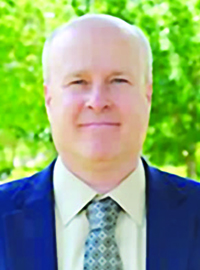
Christopher Maloney, content editor with the Encyclopedia of Alabama, was elected to a three-year term on the board of directors for the Alabama Historical Association during the organization’s annual meeting in April 2022. Founded in 1947, the Alabama Historical Association is the oldest statewide historical society in Alabama. The AHA provides opportunities for meaningful engagement with the past through publications, meetings, historical markers and other programs. The AHA is a volunteer-led and membership-supported organization.

Laura Newland Hill, communications editor with the Encyclopedia of Alabama, was the featured speaker at the Alabama Department of Archives and History “Food for Thought” lecture series in August 2022. She spoke on the Montgomery Motor Corps, a World War I women’s service organization. The lecture series is free, hour-long lectures on the history of Alabama presented on the third Thursday of each month. Programs are offered in-person and online. Visit archives.alabama.gov for information about individual programs.

D’Angelo Baker joined the Government and Economic Development Institute team in August of 2022 as a human resources specialist. As an HR specialist, Baker works to help local governments improve their HR policies and procedures. This is done through research, evaluation and training. Baker is a two-time Auburn University graduate, most recently receiving his master’s degree from Auburn in December of 2021. Baker resides in Auburn and in his free time he enjoys video games, reality television, comic books, weightlifting, and learning about a variety of topics.

Danielle Rogers recently joined the Government and Economic Development Institute staff as a human resources specialist. Rogers said, “I am thrilled to be given this opportunity and look forward to contributing to various counties across the state.”
Rogers graduated cum laude from Auburn University in May of 2022 with a bachelor’s degree in public administration. She plans to further her education by obtaining her master’s degree within the next few years. She is originally from Wetumpka, but currently resides in Auburn. Rogers loves to attend Auburn football games to cheer on the Tigers. She also enjoys spending time with family and friends. In her free time, she enjoys playing golf at the golf courses in the Auburn area
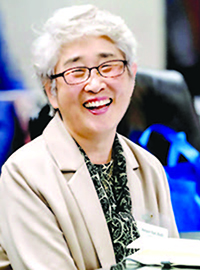
Suhyun Suh, Ph.D., coordinator for Korea Corner in the Office of Professional and Continuing Education, retired in September. She joined OPCE in 2016 where she established Korea Corner, a cultural resource center that promotes educational experiences and collaboration between Auburn faculty members, students and the local Korean community. Suh is credited for initiating several programs and events aimed toward promoting cross-cultural understanding including the Korean After School program, Korean American Grassroots Conference, language tutoring, mini-lecture series, cultural classes and volunteer opportunities. In February, Suh was appointed to the Advisory Board for the Governor’s Office of Minority Affairs by Alabama Governor Kay Ivey.
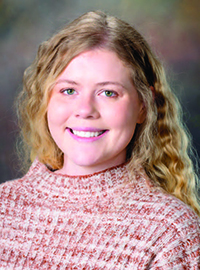
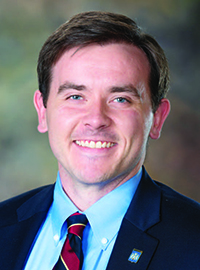

Crystal Harris (left) joined the Office of Professional and Continuing Education in December of 2021 as a program developer for Auburn Youth Programs. Throughout her career, Harris has worked with local youth programs and brings her experience to OPCE. In her role, she works with campus partners to coordinate academic camps and programs. Harris earned her undergraduate degree from Auburn University (’21) in media studies.
Jacob O’Kelley (middle) joined the Office of Professional and Continuing Education in July as a program developer for leadership programs. In his role, he manages the logistical and planning aspects of the quarterly AU Leadership Series and provides support to the Global Leadership Training Initiative. O’Kelley earned his bachelor’s degree from Auburn University (’20) in kinesiology.
Pamela Mason (right) was promoted in March to administrative support specialist II. She joined the Office of Professional and Continuing Education in 2016 and plays a vital role in the success of OPCE programs providing support through course setup, registration management and customer service. Pamela moved to Auburn from Loachapoka, Alabama. She earned her certification in business administration from Southern Union State Community College and brings over 28 years of experience in administration and customer service from previous roles with Auburn Municipal Court, Alabama Institute for Deaf and Blind and Auburn City Schools.


University Outreach recently established the department of Corporate and Community Partnerships in order to initiate, cultivate and steward relationships with local, state, and national partners for the purpose of advancing the outreach mission of the university through the development and acquisition of financial resources. Bernard Hill and Carrie Collett have been selected to staff this office.
Bernard Hill is the newly appointed director of Corporate and Community Partnerships. He most recently served as the Chief Student Development and Retention Officer at Point University. Hill served in an oversight role for the Office of Student Life and the Department of Athletics. He also served as the director of Student Success, oversaw all efforts to retain students, coordinated all orientation related activities, served as the lead Title IX Coordinator, and served as an instructor for BUS 435 Sports Law, as well as EFT 101 Effective Thinking (first-year experience course).
Hill’s previous work experience includes as a senior associate athletics director at Auburn University for 12 years and working at Stetson University as the associate athletic director for Compliance for over five years. Hill serves on the Auburn Water Works Board and previously served on the Downtown West Point Development Authority Board.
Hill received a Bachelor of Science in Health and Exercise Promotion in 1997 (Auburn University), Master of Education in Higher Education Administration in 2000 (Auburn University), and Ph. D. in Higher Education Administration in 2015 (Auburn University). He is married to Sherina Hill from Bremen, Georgia, and they reside in Auburn with their two children, Kylie and Christian.
Working with Hill in the department is Carrie Collett who serves as a development officer. Collett is actively involved in bringing awareness to and securing philanthropic support to University Outreach and its programs. She previously served as development officer for the Jay and Susie Gogue Performing Arts Center at Auburn University, where she cultivated meaningful relationships with alumni, community leaders and organizations to secure philanthropic support. She also served as program administrator for the Gogue Center’s sponsorship program. Collett is an Auburn University graduate with a bachelor’s degree in apparel merchandising and has been with working for Auburn University since 2018.

Jeremy Arthur, director of The Government and Economic Development Institute (GEDI), was selected for the 2022-2023 class of Leadership Lee County. Leadership Lee County seeks out and develops a select group of leaders who live or work in Lee County and have the potential to provide the leadership needed to solve problems of community and statewide significance. Participants are chosen based on ability, demonstrated interest in the community, and potential for responsible and effective leadership.
The program began in September with a kick-off retreat and reception and continues monthly through May. The monthly seminars highlight community issues and trends, while incorporating professional development, and the opportunity to hear from prominent leaders throughout the Lee County area. Arthur will join 29 other community leaders in this year’s class.
“Participation in Leadership Lee County is a great way for a group of citizens that call this place home to come together to look at problems facing our local communities and our state. I am honored to be selected to join the group and am excited about the upcoming year,” said Arthur. “Engaging in the local community furthers my personal goals of involvement through giving back and my professional goals working in Auburn University Outreach. Leadership Lee County will provide me the opportunity to live out one of my favorite quotes from noted sociologist and anthropologist, Margaret Mead, when she said, ‘never doubt that a small group of thoughtful, committed citizens can change the world; indeed, it’s the only thing that ever has.’ ”
The Government and Economic Development Institute’s Director Jeremy Arthur has joined the board of directors of DesignAlabama, a non-profit, citizen-led organization that works to increase the awareness and value of the design disciplines that influence our environment. DesignAlabama seeks to raise the bar for design in Alabama through education of the applied arts, promotion of designers who live and work in Alabama and support of sound design thinking to sustain communities. The board of directors is comprised of design professionals, community development officials and business professionals who champion design.
“I look forward to working with DesignAlabama as a member of the board of directors. DesignAlabama’s mission to highlight the critical importance of the design arts to creating and enhancing quality of place in Alabama pairs well with GEDI’s mission of improving civic engagement, economic prosperity and quality of life for the State of Alabama and its communities. DesignAlabama has touched every part of our great state and its work is evident. I am excited to work with them on our collective efforts to shape how we live, work and play in our communities in Alabama for the advancement of all that choose to call this wonderful place home,” said Arthur.
Send your Outreach news, opportunities, projects and programs to outnews@auburn.edu or send us your email address to join the mailing list!
The Outreach newsletter serves to provide our Auburn Family with ongoing updates regarding the tremendous outreach initiatives that are collaboratively launched between our unit and others across campus to impact citizens across Alabama and beyond. We are pleased to add this to our publication portfolio and hope this will inspire you to join us in making a difference!
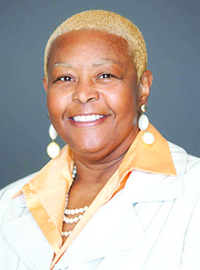
Stacey Nickson retired recently after 14 years at Auburn University. Nickson served as director of the Center For Educational Outreach and Engagement where she focused on developing K-12 programs for underrepresented students, schools and communities, by strategically expanding and strengthening Auburn University’s engagement with public, government and non-profit organizations. GearUp Alabama and Culture Bump were two of Nickson’s most notable Outreach projects.
Prior to joining Outreach, Nickson was the assistant director in Auburn University’s Biggio Center for the Enhancement of Teaching and Learning. Her work experience also includes roles as k-12 teacher and principal. Nickson was also actively involved in the Fulbright Association where she served as a director on the National Fulbright Board and president of the Alabama Fulbright Association.
Nickson earned a bachelor’s degree in public administration from Indiana University, a master’s degree in educational administration from National University in San Diego and a doctorate in educational administration from the University of Southern California.

The Office of Professional and Continuing now offers individuals the opportunity to earn a digital marketing certification. Participants can choose from associate, specialist, professional and expert certification levels depending on their goals and experience. Short courses, called tracks, can be combined to create a customized learning experience. Program topics include social media marketing, data and web analytics, digital strategy, email marketing, paid media, search engine optimization (SEO) and more.
Earning a digital marketing certification provides individuals with industry-aligned skills and knowledge needed to succeed in an increasingly competitive job market. Over the past decade, companies across industries have digitized their operations and processes. As a result, job seekers who possess digital skills will ultimately stand out from the crowd.
Programs are offered in partnership with the Digital Marketing Institute, the world’s leading digital marketing certification body. DMI certification courses are globally recognized and endorsed by top industry bodies including the American Marketing Association.
For more information or to see the complete list of digital marketing certifications and tracks, visit auburn.edu/outreach/opce/digitalmarketing.

Davis Cooper, a human resources consultant with the Government and Economic Development Institute, retired in August after serving in University Outreach for the past 11 years.
“Davis has been a valued member of the GEDI family. His contributions through his work advising local, county and state governments on human resource issues is to be commended. The impact of Davis’ work is seen across the great state of Alabama,” said Jeremy Arthur, GEDI director.
Cooper began working in Outreach in 2011 with the Center for Governmental Services, or CGS, and transitioned into GEDI in 2015 when it was formed. He is a senior certified professional, or SCP, with the International Public Management Association for Human Resources. His outreach work provided human resources consulting services, technical assistance and training to municipal and county governments and other public and non-profit organizations throughout the state of Alabama.
Cooper’s retirement is a culmination of a varied history of service to the country and state. He retired from the U.S. Air Force in 1999 as a Lt. Col. with more than 21 years of active service as an aviator, staff officer and commander and with more than 12 years of service with Northrop Grumman as a senior military and operations analyst in 2011.
Cooper received his undergraduate degree from Auburn University in 1977 and a master’s degree in human resources management from Golden Gate University in 1991. In 2018, Davis was a recipient of the Auburn University Spirit of Excellence Award.
“It has been an extremely gratifying opportunity to learn how state and local governments work and to serve these governments and elected officials in providing high- quality products and services,” Davis said. “The tag line on our presentations says, ‘Making a Difference for Alabama,’ and I believe we live up to that quote. The interactions with people— work colleagues, city and county officials and other professional acquaintances—will be what I miss most in leaving this job. I have thoroughly enjoyed my tenure with GEDI and am honored to have served the state of Alabama and contributed to Auburn University’s mission of Outreach.”
“Davis’ leadership to GEDI has helped the unit grow and make a sustainable impact to Auburn’s land- grant mission. Davis will always be a part of our GEDI team and should be proud of the legacy he leaves as he moves to his next chapter in retirement,” added Arthur.
Davis said he is looking forward to enjoying life, traveling, playing some golf, enjoying grandkids and watching Auburn athletics.
GEDI is a department of University Outreach that specializes in providing training and consulting to government agencies and employees, workers in private and nonprofit businesses, elected officials and economic development professionals. Having more than 35 years of experience, GEDI has established itself as a leading provider of economic development education and training in Alabama. For more information on GEDI and its programs, visit www.auburn.edu/gedi.
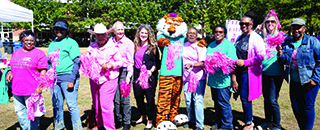
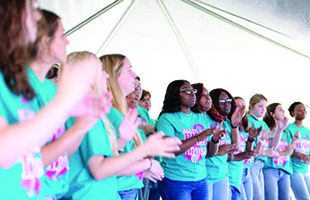

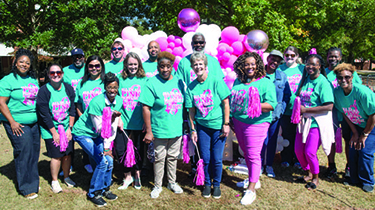
The 10th annual All In All Pink breast cancer awareness event was held October 14, 2022. More than 400 students, faculty, and staff in attendance were excited that the event was back after a two-year hiatus due to COVID. The featured speakers for the event included survivors Cindy Diffie, a retiree of Auburn University; Hollie Cost, assistant vice president for University Outreach and Public Service; and coach Johnnie Harris, Auburn’s Women’s basketball coach.
In addition to the speakers, Chippewa Thomas, director of Faculty Engagement and professor, was the mistress of ceremony. The Auburn University Gospel Choir opened and closed out the event with song. The event also included a variety of services from program partners. Phi Delta Chi Pharmaceutical Fraternity provided blood pressure checks and glucose monitoring. The Spencer Cancer Center distributed information about mammograms and scheduling screenings. Auburn’s College of Nursing distributed information about the signs of breast cancer and displayed samples. The Gene Machine and Tuskegee University’s Chi Eta Phi Sorority Inc. nursing organization talked to students about getting screened and being body aware.

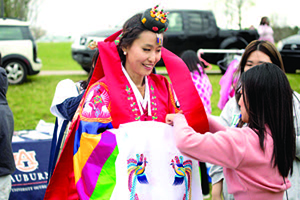
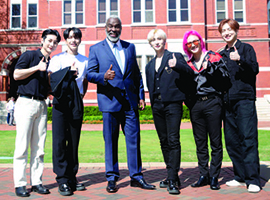
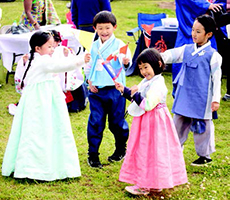
Global Community Day Festival is a day for bringing international and non-international communities together to learn and experience global culture, history, and related opportunities. The Covid-19 pandemic has taught the world that valuing and protecting diverse cultures is more crucial than ever. Outreach Global Office believes that uniting communities to experience diverse perspectives will enhance awareness and critical thinking about social issues such as cultural differences, customs, traditions, religion, politics and the world economy.
SAVE THE DATE
04.15.2023
9am - 6pm
Global Community Day Festival
Check our website for updates on the festival.
auburn.edu/outreach/global/communityday
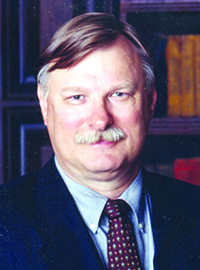
Richard Alekna, former director of distance learning in Auburn University Outreach, passed away recently at age 75 at his home in Opelika. Alekna had a 30-year career in teaching and higher education administration culminating in his appointment at Auburn where he worked from 1991 until 2007.
Born in Chicago and raised in Indiana, Alekna attended Indiana State University before joining the U.S. Air Force. During his service, he was stationed in the Aleutian Islands as a Russian linguist assigned to the Air Force Security Service and at the National Security Agency.
Following military service, he completed his bachelor and master’s degrees in English/American literature at Indiana State and embarked on his career in higher education. An administrator and faculty member at Virginia Commonwealth University in the English department and the Continuing Studies division, he served as an assistant director in the Evening and Summer Studies Office.
He founded the Office of Media Instruction in 1984 and served as its director for seven years. As director, Alekna led the development of VCU’s distance learning program and served on the National University Teleconference Network coordinating committee delivering live educational programs nationally via satellite.
Alekna joined Auburn University Outreach in 1991 as head of the independent study program within the Continuing Education office. From there, he helped establish the university’s first central distance education support infrastructure and academic policies which lead to the expansion of distance programming campus wide. In 1993, he was appointed director of University Outreach’s new Office of Distance Learning and Outreach Technology, and he served in that post until retiring in 2007.
“Mr. Alekna pursued his work with the highest degree of academic professionalism and integrity,” notes Royrickers Cook, vice president for University Outreach. “He laid the foundation benefiting an array of effective distance programs across campus serving extended students and left a body of policy and assessment scholarship which still undergirds Auburn outreach programming today.”
After retirement, Alekna continued to reside in Opelika. An avid fisherman, he joined the Bass Anglers tournament tour as a competitor, participating in tournaments throughout the southeast and beyond. He was also a talented literary writer and artist.
Mr. Alekna was preceded in death by Susan, his wife of 38 years. They are interred at Garden Hills Cemetery in Opelika.
Last Updated: March 4, 2023

